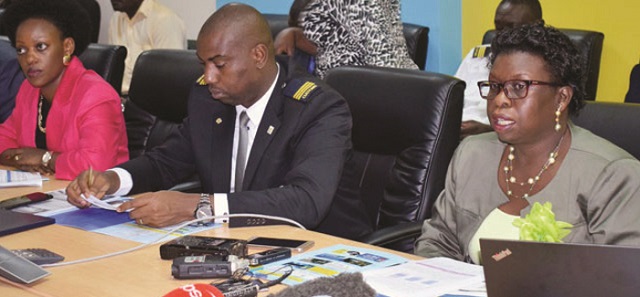
Tax experts say government needs to refocus its priorities
Kampala, Uganda | JULIUS BUSINGE | Uganda Revenue Authority has good and bad news these days. The tax body is collecting more and more money but, at the same time, is failing to meet ever rising annual targets. The pattern of missed tax revenue collection targets has been going on for most of the last five years and URA Commissioner General, Doris Akol, wants to change that. In search of solutions, The Independent spoke to tax experts.
In the just concluded Financial Year (2016/2017), the tax body recorded a 13% growth in revenue collection but ended up with close to Shs 500 billion revenue collection as shortfall because of the new target of Shs 13.2 trillion.
Similarly, the year before that (2015/16), collections grew by 15.6% but with Shs 404 billion as shortfall (target was Shs 11.6 trillion). The target for the FY 2017/18 is Shs15 trillion, which is 14% higher than last year.
In response to the missed targets, Akol told journalists in Kampala on July 24 that it is partly caused by government introducing more of revenue reducing tax measures and fewer revenue increasing measures. While answering a question from one of the journalists in their meeting at the URA headquarters in Kampala, Akol said “unfortunately” the URA mandate stops at tax collection. She did not elaborate but signaled a need for a better balance between new tax revenue reducing and generating policies.
She said, to set the revenue collection targets, the government bases on macroeconomic indicators like projected rate of growth of economic activity and currency exchange rate movements, but these have been volatile and unfavourable.
Economic growth has averaged between 4-5% for the last five years, which is far below the projected 6-7% growth rates of the comparable period before. The exchange rate of the Shilling against other currencies, especially the U.S. dollar, has been persistent high and rising. This has increased the cost of doing business, constrained demand, and resulted in reduced tax revenue.
To add to the challenge of collecting more taxes, the government introduced several income tax exemptions for Bujagali Hydropower Project, Savings and Credit Co-operatives (SACCOs), professional bodies like the Institute of Certified Public Accountants of Uganda, and the agriculture sector.
Akol did not share the extent of loss in revenue by these exemptions but the big picture is contained in a report released in June 2016 by Tax Justice Network – Africa and ActionAid that indicated Uganda was losing Shs 1 trillion per year in form of tax holidays and royalty exemptions given to mostly foreign firms. The Shs1 trillion mentioned might be far smaller than the actual figure given that some tax exemptions are negotiated secretly by parties involved, according to people familiar with the subject.
But even the conservative loss of Shs1 trillion is big; it dents the budget as it could easily finance up to four major ministries; agriculture, tourism – trade and industry, ICT (and) national guidance, and science technology and innovation. These sectors were allocated a total of Shs980 billion in the FY2017/18 national budget.
Akol’s collection plan
In an effort to boost URA’s chances of hitting the stretched revenue target, Akol said URA’s revenue collection plan for this financial year, would build on the already existing infrastructure investments in the previous years, introduce new tax revenue generating measures, continue fostering a taxpaying culture, and ease the process of tax compliance. The new tax revenue generating measures are projected to fetch about Shs450 billion for URA.
Akol said URA will emphasise zero tolerance to corruption, investing in non-bureaucratic processes to ease tax administration efficiencies, and ensure quality service delivery.
Actual activities would include tax education programs, risk management enhancements, focus on rental tax enhancements, and rolling out the single customs territory. Other areas include upgrading e-platforms to match with the increasing number of goods, enhancing use of information and data analysis to help in effectively analysing returns to guarantee that the right tax amount is declared and remitted across all sectors. The tax body will also launch, for its internal operations, an enterprise resource planning module – which is an automated system that manages financial accounting, stocks and requisitions of goods and items in addition to managing staff -related functions.
 The Independent Uganda: You get the Truth we Pay the Price
The Independent Uganda: You get the Truth we Pay the Price



